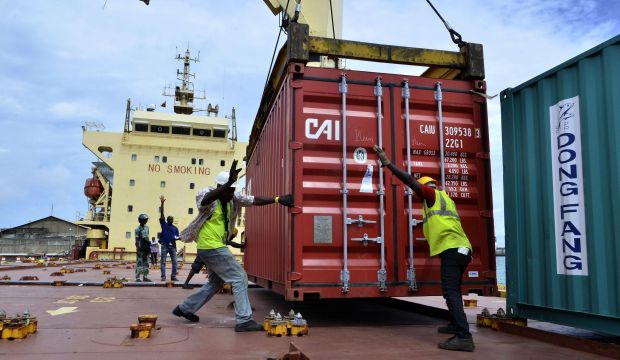
Workers move a container of rice destined for Monrovia and Freetown, both suffering from Ebola virus epidemics, at the port of Cotonou, Benin, on October 13, 2014. (Reuters/Charles Placide)
London, AP—West Africa could see up to 10,000 new Ebola cases a week within two months, the World Health Organization said Tuesday, also confirming the death rate in the current outbreak has risen to 70 percent.
WHO assistant director-general Dr. Bruce Aylward gave the figures during a news conference in Geneva. Previously, WHO had estimated the Ebola mortality rate was at around 50 percent.
Aylward said the new rate confirmed it was “a high mortality disease,” and that the UN health agency was still focused on trying to get sick people isolated and provide treatment as early as possible.
He told reporters that if the world’s response to the Ebola crisis is not stepped up within 60 days, “a lot more people will die” and that health workers will be stretched even further dealing with the spiraling numbers of cases.
Health care workers have also been hit hard by the virus. International aid organization Doctors Without Borders said that 16 of its staff members have been infected with Ebola and nine of them have died.
Speaking at a news conference in Johannesburg Tuesday, the head of Doctors Without Borders in South Africa, Sharon Ekambaram, said medical workers have received inadequate assistance from the international community.
“Where is WHO Africa? Where is the African Union?” said Ekambaram who worked in Sierra Leone from August to September. “We’ve all heard their promises in the media, but have seen very little on the ground.”
For the last month, there’s been about 1,000 new Ebola cases per week—including suspected, confirmed and probable cases, he said, adding that WHO is aiming to get 70 percent of cases isolated by December to reverse the outbreak.
WHO increased its Ebola death toll tally to 4,447 people on Tuesday, nearly all of them in West Africa, from 8,914 cases.
Sierra Leone, Guinea and Liberia have been the hardest hit nations in the current epidemic. Aylward said WHO was very concerned about the continued spread of Ebola in the three countries’ capital cities—Freetown, Conakry and Monrovia—where people move freely across borders.
While some regions have seen the number of Ebola cases stabilize or fall, Aylward said “that doesn’t mean they will get down to zero.”
He said WHO was still focused on trying to treat Ebola patients, despite the huge demands on the broken health systems in West Africa.
“It would be horrifically unethical to say that we’re just going to isolate people,” he said, noting that new strategies like handing out protective equipment to families and setting up very basic clinics—without much treatment—was a priority.
Aylward said there was no evidence any countries were hiding Ebola cases but said countries bordering the affected area, including Ivory Coast, Mali and Guinea-Bissau, were at high risk of importing the disease.
“This is not a virus that’s easy to suppress or hide,” he said, noting there has not been a huge amount of international spreading so far. “I don’t expect this virus to just go anywhere. There is exit screening in place and sick people won’t be moving.”
In Berlin, a UN medical worker infected with Ebola in Liberia died despite “intensive medical procedures.” The St. Georg hospital in Leipzig said Tuesday that the 56-year-old man, whose name has not been released, died overnight of the infection.
The man tested positive for Ebola on October 6, prompting Liberia’s UN peacekeeping mission to place 41 other staff members under “close medical observation.”
He arrived in Leipzig for treatment on October 9. The hospital’s chief executive, Dr. Iris Minde, said at the time there was no risk of infection for other people, since he was kept in a secure isolation ward specially equipped with negative pressure rooms that are hermetically sealed.
He was the third Ebola patient to be flown to Germany for treatment. The first man recovered and returned home to Senegal. A Uganda aid worker is still being treated in Frankfurt.
In Spain, the government’s Ebola monitoring committee said the assistant nurse infected with the virus had experienced another slight improvement and although she remains stable, she is still in serious condition.
The nurse, Teresa Romero, was admitted into Madrid’s Carlos III hospital October 6. She contracted the disease after treating a Spanish missionary who fell victim to the disease while in West Africa and died at the Madrid hospital last month.
Fifteen people who came into contact with Romero and who are being monitored at the hospital have not shown any Ebola symptoms.
